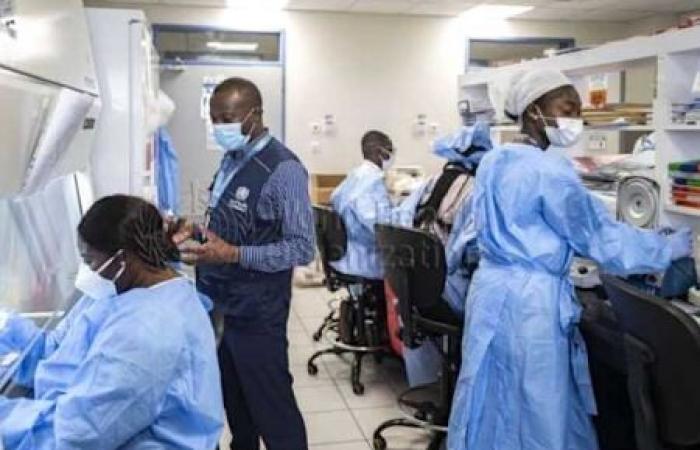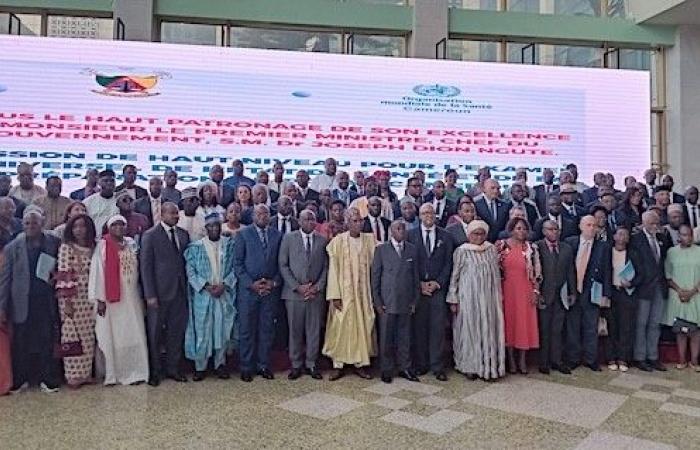(Ecofin Agency) – This week in Africa: Rwanda records nine deaths due to the Marburg virus, cousin of Ebola; Pharmaceutical giant Gilead announces drastic drop in costs for Lenacapavir, an anti-HIV treatment, for 120 low-income countries. WHO approves PCR test to more effectively diagnose mpox on the continent; polio reappears in northern Nigeria. And in Togo, deaths due to cholera…
Epidemics of Marburg in Rwanda
In Rwanda, the first Marburg disease epidemic is confirmed, and cases are increasing. According to the latest data from the Ministry of Health, there have now been nine deaths linked to the Marburg virus, with 27 confirmed cases.
First identified on September 27, 2024, the outbreak is currently affecting seven of the country’s 30 districts, a situation that has put health authorities on high alert.
With a mortality rate of up to 90%, the Marburg virus (a “cousin” of Ebola), is transmitted through contact with bodily fluids. His illness can have a devastating impact on those affected. This is why Rwanda is working to slow its progression, while increasing its screening and contact tracing capacity.
To contain the virus, strict measures have been put in place, such as suspending hospital visits for 14 days, limiting funeral gatherings to 50 people, and banning home wakes. At the same time, the Ministry of Health is intensifying awareness and surveillance across the country.
HIV-AIDS: Gilead will cut prices on treatment for 120 countries
Gilead Sciences announced this week that it has signed royalty-free voluntary licensing agreements with six generic drug manufacturers, to increase access to its anti-HIV drug, Lenacapavir, in 120 high-incidence, resource-limited countries. According to the pharmaceutical giant, these agreements aim to provide quality, low-cost generic versions, in mainly low- and middle-income countries, once regulatory approvals are obtained.
“Lenacapavir has transformative potential for HIV prevention”said Daniel O’Day, CEO of Gilead. For the company, these efforts are part of its strategy to make treatment accessible in the most affected regions, in collaboration with partners such as Dr. Reddy’s Laboratories and Hetero.
Gilead thus indicates that it is committed to supplying the drug without profit, until generic manufacturers can meet demand. This agreement also concerns the use of Lenacapavir for the treatment of adults with multidrug-resistant HIV.
In the short term, the company plans to launch the first global regulatory filings by the end of 2024, with specific efforts in 18 priority countries (including Nigeria, Rwanda, Eswatini and Zambia).
Cameroon evaluates its health system
Cameroon, leader in the management of epidemics in Central Africa, launched this Friday, October 3, a workshop devoted to the evaluation of its health system and the preparation of emergency responses. This event, organized with the WHO, was opened by Mr. Jacques Fame Ndongo, Minister of Higher Education, representing the Prime Minister, in the presence of senior government officials and the Deputy Director-General of the WHO.
The initiative follows a commitment made two years ago by President Paul Biya and aims to strengthen the country’s capacity to respond to health crises, such as the COVID-19 pandemic. “ We evaluate our health system to better anticipate emergencies and request international funding for our priority projects », declared the Minister of Public Health, Mr. Manaouda Malachie
Mpox: WHO approves PCR test for more effective diagnosis in Africa
The World Health Organization (WHO) has given the green light to the use of the first PCR test for the diagnosis of mpox (formerly “monkey pox”).
Called Alinity mMPXV and manufactured by Abbott Molecular, the test detects variants 1 and 2 of the mpox virus from skin lesion samples.
The new device is expected to significantly improve diagnostic capacity in affected countries, where testing capacity remains limited.
« Early diagnosis is essential for rapid treatment and effective control of the virus “, according to Yukiko Nakatani, Assistant Director-General of the WHO.
To date, the continent is reporting more than 30,000 suspected cases of mpox, and nearly 900 deaths, mainly in the Democratic Republic of Congo, Burundi and Nigeria. This approval of a PCR test should therefore provide a boost in the detection and care of patients, and facilitate the fight against the viral disease.
Nigeria: four new cases of polio recorded after three years of “polio-free” certification
In the North-East of Nigeria, polio is reported after three years of absence. The Yobe State government has announced the detection of four new cases of polio, marking the return of the virus three years after the state was declared polio-free.
The cases were reported from Bursari, Machina and Yusufari local government areas (LGAs), according to Dr Babagana Kundi-Machina, executive secretary of the State Primary Healthcare Board.
In response, authorities launched a statewide vaccination and awareness campaign, with support from the World Health Organization (WHO). For his part, the WHO State Coordinator, Dr. Hamisu Alhassan, encouraged the population to adopt preventive measures such as personal hygiene and immunization to enhance herd immunity.
Cholera: 11 dead in Ebonyi State (Nigeria)
Still in Nigeria, in the south-east this time, the new cholera epidemic has claimed at least 11 victims (men, women and children), in the village of Ndibokote, located in the region of Ezza Inyimagu, in the Ebonyi State.
The information was confirmed by Dr. Moses Ekuma, the state health commissioner. According to its details, the epidemic, reported on September 23, 2024, notably cost the life of a breastfeeding mother, leaving behind a 9-month-old baby.
Nearly 20 other affected people are currently receiving medical treatment at local health centers. The state governor, Francis Nwifuru, has released funds to strengthen efforts to combat the disease. Local authorities have called on the population to take precautionary measures, particularly in case of symptoms of diarrhea and vomiting, in order to curb the spread of the disease.
Cholera, often caused by contaminated water and inadequate sanitation, remains a serious threat in areas where access to clean water and sanitation is limited.
…and four deaths in Togo
Nigeria is not the only country to record cases of cholera in the sub-region. This is particularly the case of Togo. In this coastal country, the Ministry of Health announced an increase in cholera cases in the Gulf health district, in the south of the country. Since August 2024, several cases have been confirmed, resulting in the death of four people, including two at home.
Among the measures taken to address the situation are: early detection of cases, free treatment of patients and a vast awareness campaign on preventive measures.
Ayi Renaud Dossavi
Read also :
Soon a West African antimalarial: weekly health update
Guinea, Ivory Coast, Morocco, Africa fights against mpox: weekly health update
14 African countries will support WHO Africa; the fight continues against mpox: the weekly health update







